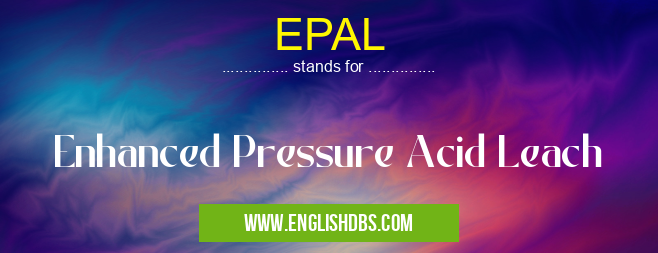What does EPAL mean in CHEMISTRY
EPAL, an acronym that stands for Enhanced Pressure Acid Leach, is a specialized hydrometallurgical extraction process used to recover metals from ores and other materials. This technique combines high pressure and temperature conditions with acidic solutions to dissolve and extract valuable metals, offering several advantages over conventional leaching methods.

EPAL meaning in Chemistry in Academic & Science
EPAL mostly used in an acronym Chemistry in Category Academic & Science that means Enhanced Pressure Acid Leach
Shorthand: EPAL,
Full Form: Enhanced Pressure Acid Leach
For more information of "Enhanced Pressure Acid Leach", see the section below.
Process Description
EPAL involves the following steps:
- Pressurization: The ore or material is subjected to high pressure, typically ranging from 10 to 50 atmospheres.
- Acid Leaching: An acidic solution is introduced into the pressurized system, where it reacts with the metal-bearing minerals, dissolving and extracting the target metals.
- Separation: The leachate containing the dissolved metals is separated from the solid residue (tailings) through filtration or other separation techniques.
- Metal Recovery: The dissolved metals are recovered from the leachate using various methods such as solvent extraction, precipitation, or electrolysis.
Advantages of EPAL
- Increased Metal Extraction: The high pressure and temperature conditions enhance the dissolution and extraction of metals, resulting in higher recovery rates compared to conventional leaching methods.
- Improved Selectivity: The controlled conditions of EPAL allow for selective extraction of specific metals, minimizing the leaching of impurities.
- Reduced Reagent Consumption: The optimized conditions of EPAL lead to lower reagent consumption, making the process more cost-effective.
- Reduced Processing Time: The accelerated leaching process reduces the overall processing time, resulting in increased production efficiency.
Applications
EPAL is widely used in the mining industry for extracting metals from ores such as copper, nickel, zinc, and gold. It is also employed in the recovery of metals from secondary sources, such as electronic waste and batteries.
Essential Questions and Answers on Enhanced Pressure Acid Leach in "SCIENCE»CHEMISTRY"
What is Enhanced Pressure Acid Leach (EPAL)?
EPAL is a hydrometallurgical process used to extract valuable metals from ores, such as copper, nickel, and cobalt. It involves leaching the ore in a pressurized vessel with a mixture of sulfuric acid and oxygen.
How does EPAL work?
In EPAL, the ore is crushed and mixed with sulfuric acid and oxygen in a pressurized vessel. The oxygen oxidizes the metal sulfides in the ore, while the sulfuric acid dissolves the metal oxides. The resulting solution contains the dissolved metals, which can then be further processed to extract the desired metals.
What are the advantages of EPAL?
EPAL offers several advantages over conventional leaching processes, including:
- Faster leaching rates
- Higher metal recoveries
- Reduced energy consumption
- Lower operating costs
What are the applications of EPAL?
EPAL is primarily used in the extraction of copper, nickel, and cobalt from ores. It can also be used to extract other metals, such as zinc, lead, and gold.
Is EPAL an environmentally friendly process?
EPAL can have some environmental impacts, such as the generation of waste sulfuric acid and sulfur dioxide gas. However, these impacts can be mitigated by using appropriate pollution control technologies.
Final Words: EPAL is a highly effective and versatile hydrometallurgical extraction process that offers several advantages over conventional methods. Its ability to enhance metal extraction, improve selectivity, reduce reagent consumption, and shorten processing time makes it a valuable tool in the mining and metal recovery industries.
EPAL also stands for: |
|
| All stands for EPAL |
